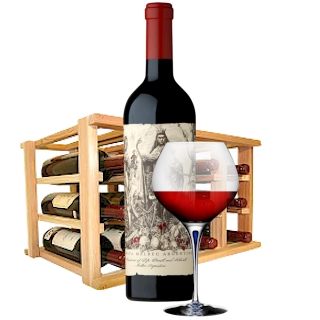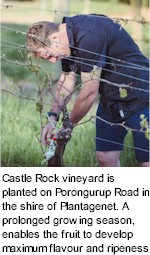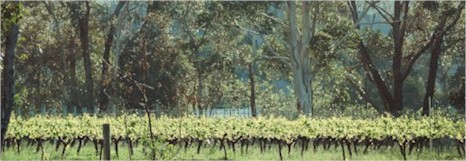


Castle Rock vineyard is planted on Porongurup Road in the shire of Plantagenet. It is set high in the Porongurup Ranges, which are 40 km north of Western Australia's south coast regional center Albany. The altitude, 350 meters, and the position of the vineyard, which exposes the vines to cooling south-east breezes results in a prolonged growing season, enables the fruit to develop maximum varietal flavour and ripeness. The vineyard has a cool and elevated northerly aspect, resulting in intensley flavoured wines. The first varieties (Riesling and Cabernet Sauvignon) were planted in 1983. Those first two hectares were followed in 1986 with Chardonnay and Pinot Noir with further plantings of Riesling and Cabernet Sauvignon. Later planting included Merlot and Cabernet Franc. In 1996, the 10th anniversary of the first vintage, preparation commenced with an additional area planted with Sauvignon Blanc and Chardonnay.

Towards the end of 1981 the 55 hectare property was specifically selected by Angelo and Wendy Diletti to grow premium quality table wine grapes. The choice was based on the altitude, an approximate eastern slope, well-drained soils and excellent water catchment potential. The wide arc of magnificent views has been the bonus. The wines from Castle Rock Estate were made under contract at Alkoomi winery from 1986 to 2000. The next phase of growth was to make wines on site at Castle Rock Estate. After the 2000 vintage the decision was made to bite the bullet and proceed with plans to build a 200 tonne winery on the estate. Despite having nearly twelve months, it was only just completed on time, the first tanks arriving only four days before the first grapes arrived.
The winery building makes use of the natural slope of the land and is built on two levels. The winery is a blend of age old, proven techniques and some equipment which is state of the art. The upper level houses four six tonne red fermenters.
The grapes are crushed and fermented on the upper level of the winery, then gravity fed into the press below, thus doing away with the need to pump the must. This is very important for Riesling as it reduces skin and seeds which give the juice hard phenolics. When the reds have finished fermenting, the press can be positioned below and filled simply by opening the door!
The press, de-stemmer/crusher and refrigeration system were bought brand new to be sure of their ability, performance and reliability. The use of gravity ensures the right balance to maximise quality. Castle Rock's wines are bottled on site by a portable bottling line which is set up on the back of a semi trailer. This is an ideal arrangement to avoid sending the wine away in a bulk tanker. Bottling on site means Castle Rock can be sure that the quality and freshness of the wine is maintained. Everything done at Castle Rock places a priority on growing great fruit and making exceptional wine. Mother Nature sets the environment, the growers and viticultural team maximize the gifts of the elements. All that's left for the winemaker is to complete the natural process which translates superb quality fruit into an outstanding range of magnificent Great Southern wines.
